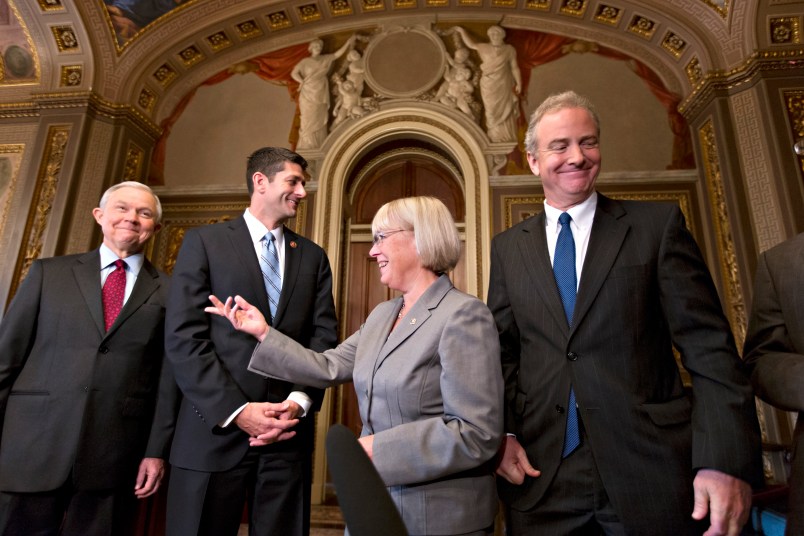In a major breakthrough after three years of paralyzing partisan rifts, Congress’ top two budget chiefs finalized a bipartisan agreement Tuesday that would set spending levels for two years and mitigate some of the painful spending cuts required by the sequester.
The deal announced by Rep. Paul Ryan (R-WI) and Sen. Patty Murray (D-WA) would establish spending at $1.012 trillion in 2014 and $1.014 in 2015 — up from the $967 billion under the sequester. It provides for about $63 billion in sequester relief, divided equally among defense and non-defense programs.
The agreement offsets the sequester relief with a mix of targeted spending cuts and non-tax revenues via higher government fees and sales, totaling $85 billion over 10 years. That means it would reduce the deficit by $20-$23 billion. The revenue raisers include higher federal worker contributions to their retirement benefits and higher airline ticket fees. In an effort to secure conservative support, none of the revenues come from the tax code.
“I see this agreement as a step in the right direction. In divided government, you don’t always get what you want,” Ryan told reporters on Tuesday evening, announcing the deal beside Murray. “This agreement is a clear improvement on the status quo.”
“I am very proud to stand here today to announce with Chairman Ryan that we have broken through the partisan gridlock,” Murray said. “Because of this deal the budget process can stop lurching from crisis to crisis.”
Crucially, if the deal passes Congress, it would mark a return to normal budgeting after three years of funding the federal government in short-term measures, which led to the first shutdown since 1996 earlier in October.
The deal also does not touch Social Security, Medicare benefits or other “mandatory” spending, which was a necessary prerequisite to win over Democrats, who objected to cutting those programs unless federal tax loopholes were closed to raise revenues. The deal does, however, extend the sequester’s 2 percent cuts to Medicare providers by two years. Instead of lapsing in 2021, those cuts will now lapse in 2023, a senior Democratic aide said.
“Today’s bipartisan budget agreement is a good first step,” President Barack Obama said in a statement. “[I]t’s a good sign that Democrats and Republicans in Congress were able to come together and break the cycle of short-sighted, crisis-driven decision-making to get this done. That’s the way the American people expect Washington to work. I want to thank Senator Murray, Congressman Ryan and all the other leaders who helped forge this bipartisan agreement.”
Now comes the hard part. The deal has to be fleshed out into a bill and passed by the both chambers. Then Congress will have until Jan. 15 to pass and consolidate appropriations bills to keep the government running and avert another shutdown.
In the Republican-led House, which is set to adjourn Friday for the rest of the year, numerous conservatives oppose the framework because they want to maintain federal spending at the sequester level of $967 billion in 2014. Outside conservative groups including Heritage Action, Americans For Prosperity and FreedomWorks — who are very influential among House Republicans — made their opposition to the deal known before it was announced, calling for keeping spending low and for cuts to entitlement programs.
There are reasons to believe the deal may pass, though. House Republican leaders, whom Ryan briefed on the negotiations Tuesday afternoon, support the framework. Military hawks are eager to relieve some of the defense cuts. Republican appropriators who have to actually apply the cuts believe they are unsustainable. GOP leadership’s aim is to release the bill by midnight on Tuesday night, have Ryan brief the conference at their meeting Wednesday morning to shore up support, and hold a vote on it Thursday.
“I think conservatives should vote for this. I think we will pass it through the House. I have every reason to expect great support from our caucus,” Ryan told reporters, stressing that it would reduce the deficit without raising taxes or compromising conservative principles.
The Senate poses fewer problems. Senate Majority Whip Dick Durbin (D-IL) said there’s a “positive feeling” about the deal in the Democratic caucus and Senate Minority Leader Mitch McConnell (R-KY) expressed openness to it on Tuesday afternoon.
Ryan and Murray told reporters on Tuesday that the agreement would not extend emergency unemployment benefits, which expire for some 1.3 million Americans on Dec. 28. That issue may be addressed separately.
“I’m hopeful now that we can get this bipartisan deal through the House, and then through the Senate before we go home for the holidays,” Murray said.
Here’s an officially summary of the deal, via the House Budget Committee.






